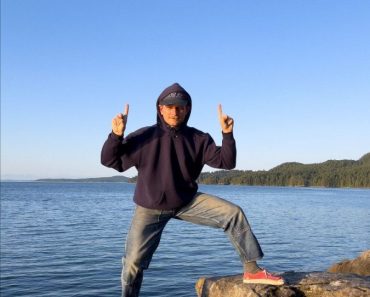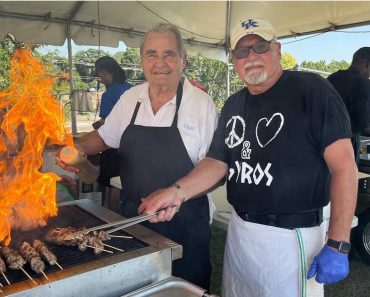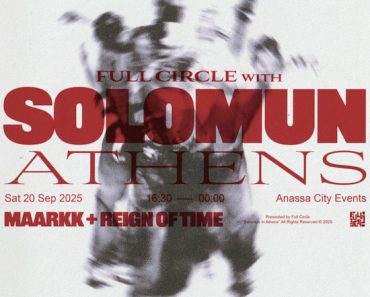At 9.30 a.m., 17 students from the Institute of Theology at the University of Balamand in Lebanon arrived at the Monastery of the Great Meteoron – the largest and most imposing building in the Meteora monastery complex of central Greece, perched high atop a massive rock. Their excitement was palpable; not even the 300 steps they had to climb in the heat – almost running – seemed to faze them. This wasn’t just another tourist visit. It was something they had long anticipated with great eagerness.
At the entrance, one of the monastery’s six monks greeted them warmly. Skipping the long line of tourists, they made their way to one of the monastery’s churches to meet Archimandrite Nephon Kapsalis, the abbot. He had visited Balamand the previous year and was now happily returning the hospitality.
“Visiting your land was a revelation – a humbling experience,” he told the group. “In Greece, attending church and worshiping God is something we take for granted. But there, we saw faith expressed differently. You live with war, with many denominations, and without complete freedom. Yet, you bear witness to your faith.”
He paused, waiting for the translation by the group’s chaperone, the institute’s dean, Archimandrite Jack Khalil. But Father Jack replied with a proud smile: “There’s no need. All our students speak Greek.”
For the past four years, this renowned institution – the only Orthodox theological school in the Middle East – has been operating again with Greek as its primary language of instruction. “It was a difficult effort that took 20 years to realize,” Father Jack told Kathimerini.
Fittingly, his first Greek-language mission also began at Meteora.
“Do you happen to remember a group of students from Lebanon in the summer of 1996?” he asked Lemonia, the hotel owner, that morning. She made a valiant but unsuccessful effort to recall him. He was 27 at the time, having just left a career in banking to begin theological studies at Balamand. There, he met Dean Paul and his brother John – then a bishop, now patriarch of Antioch.
“The two brothers had a deep connection with Greece and great admiration for the Greek spirit. They always told us, ‘Greece is our nourisher, our spiritual mother,’” Father Jack recalls. It was they who initiated the summer student programs in Greece.
“For those of us who grew up with cassette tapes and CDs of renowned chanters, with photos and books from monasteries, finally setting foot in Greece was a dream come true. I was overwhelmed with joy – and I now see that same joy in the faces of my students,” he adds.
A few months before that first mission, Paul and John had traveled to Greece for a series of meetings. Young Jack accompanied them, unaware of their ambitious plan to make Greek the official language of the school. One of their first meetings was with Habib Lavant, a Syrian graduate and former teacher at the institute who lived in Greece and taught Greek to Arabic speakers at the Hellenic Air Force Academy and the university.
In an earlier interview with Kathimerini, Lavant recalled his initial surprise at their proposal.
“So, you want to create something like the Halki Theological School in Lebanon? Where students speak Greek in an Arabic-speaking environment?” he asked.
“Yes,” they replied.
Lavant understood the challenges. Many feared the “Hellenization” of the school. But the brothers were resolute. They secured support from the Greek Ministry of Foreign Affairs and the archdiocese. In September 1996, Lavant began intensive Greek-language instruction. By the second year, professors and hierarchs from Greece were teaching exclusively in Greek. Over time, hundreds of students – many of whom now hold senior positions in the Middle East’s Orthodox patriarchates – were trained in the language of the Gospel and became fluent in Greek.
A sudden shift
But in 2005, a shift in the Lebanese government brought changes to the school. Patriarch Ignatius appointed a new dean, who lacked theological training and had a different vision for the institute. He invited professors from England and Germany. When Lavant returned that September to resume teaching, he found his course removed from the curriculum. The dean refused even to meet with him. A few days later, Lavant returned to Athens, and the Greek-language program was officially discontinued.
“We were all heartbroken,” recalls Father Jack, who also left the school a year later to teach in Europe. Yet, his heart remained in Balamand, and he hoped to one day return.
In 2013, Paul was abducted by Islamist militants and has remained missing ever since. A year earlier, John had been elected patriarch of Antioch. Along with a newly appointed dean, they attempted to re-establish ties with Greece. Initially, they received no response.
Then, in 2020, the patriarch called on Father Jack to return as dean, with a clear mission: to restore Greek at the institute.
‘For those of us who grew up with cassette tapes and CDs of renowned chanters, with photos and books from monasteries, finally setting foot in Greece was a dream come true’
“You know what this means for the school,” the patriarch told him.
One of Father Jack’s first calls was to Lavant. He explained the renewed effort and sought his advice. Though seriously ill and aware that his time was limited, Lavant’s enthusiasm was undimmed – he immediately began planning.
As soon as Covid pandemic restrictions were lifted, the patriarch sent Father Jack to Greece. According to sources close to those efforts, there was initial skepticism. The Patriarchate of Antioch was seen by some in Greece as a “satellite” of Russia. But Father Jack addressed their concerns candidly, offering specific examples.
“They understood that we are independent. We have the option to collaborate with other countries, but we choose Greece,” he says.
In the following months, they rebuilt the program from the ground up, securing professors willing to live and teach in Lebanon. Yet, challenges remained. Just last September, amid rising regional tensions, the Greek Ministry of Foreign Affairs issued a travel advisory, threatening to derail the program.
“We didn’t give up. We reached out to the School of Modern Greek Language at Aristotle University of Thessaloniki and arranged for a special online course for our students, funded by the ministry,” he explains.
‘Our faith unites us’
One of the students is Peter, who began his studies at the school in September 2024. From a young age, he had chanted in church and visited Mount Athos. He had graduated with honors in computer science, specializing in artificial intelligence, before deciding to pursue theology.
“When I first learned that everything would be taught in Greek, I was scared. I couldn’t understand why. But now, I do,” he tells Kathimerini.
“When I first visited Mount Athos, I needed a translator. Now that I speak the language, it’s a completely different experience. I feel free,” he adds.
Eddy, who originally studied mechanical engineering, says that learning Greek actually made him more eager to study at Balamand. The summer before he started, he took intensive lessons on his phone using Duolingo, and a year later, he seizes every chance to speak Greek.
“I truly feel at home here. Our faith unites us,” he says.
Rony and Zawad, who have just completed their first year of Greek, have begun their theology classes – this is their second summer studying in Greece.
“I have no words to describe the experience,” says Zawad. “What we read in books suddenly comes alive right in front of us. The Holy Fathers are here, living with us.”
“When we chant, we understand the words. They belong to us,” adds Rony.
Their thoughts, of course, remain with their homeland, Syria, which faces daily challenges.
“Our origins are from Bosra-al Sham – the region where the Apostle Paul ‘went into Arabia,’” they say.
The Balamand Monastery, founded in 1157 by the Crusaders, has long been a sanctuary for Middle Eastern Christians.
“Our lives have become much harder – explosions in Christian neighborhoods, intense proselytism by Muslims, job dismissals because of religion. Not only in Syria but also in Lebanon,” Father Jack explains during a meal offered to the students by Metropolitan Theoklitos of Stagoi and Meteora.
“We must address their problems. These are our people, our brothers. We are one people,” the metropolitan tells Kathimerini.
When the meal ends, he asks John, a young professor from Balamand – whom he affectionately calls “the nightingale” – to chant the hymn “Axion Esti.” That was only the beginning.
Later, at a taverna in Kalabaka, at the foot of Meteora, the Greek music playing on the radio is turned off, and the chanting continues late into the night. Before they leave, the metropolitan gives them his blessing:
“May God grant you health and strength to persevere. Stay in your homelands. Christianity was born there. If you abandon them, it’s over,” he tells them.







